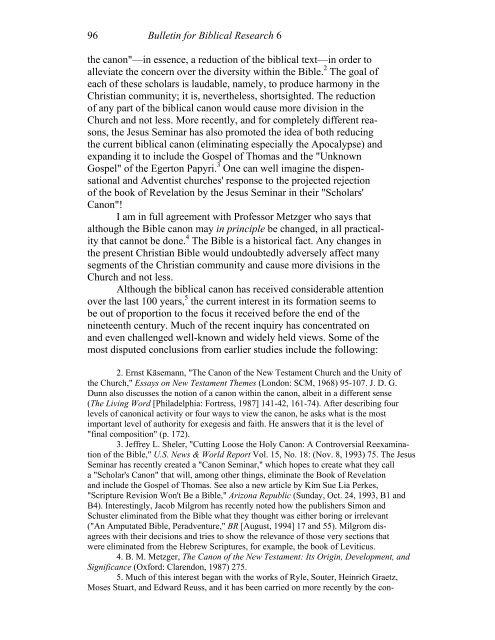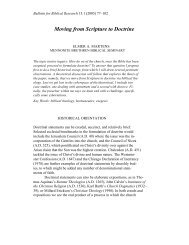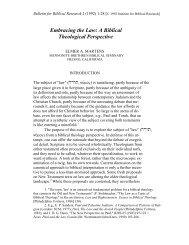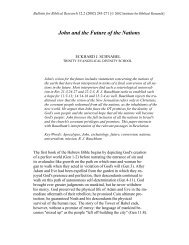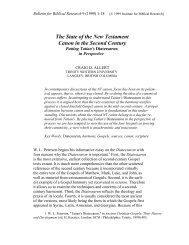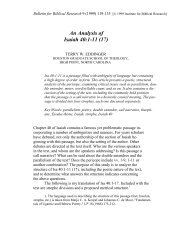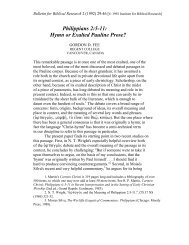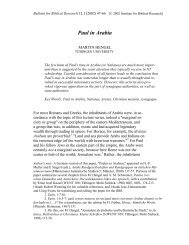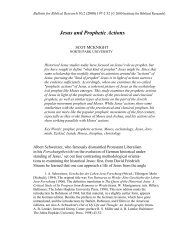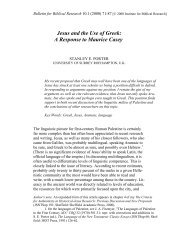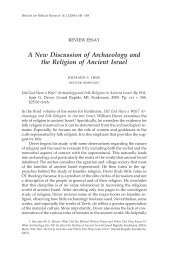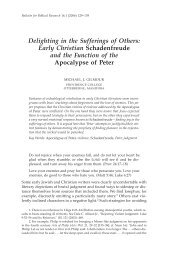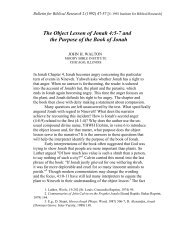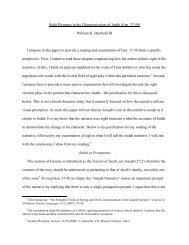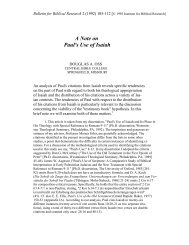The Integrity of the Biblical Canon in Light of Its Historical ...
The Integrity of the Biblical Canon in Light of Its Historical ...
The Integrity of the Biblical Canon in Light of Its Historical ...
You also want an ePaper? Increase the reach of your titles
YUMPU automatically turns print PDFs into web optimized ePapers that Google loves.
96 Bullet<strong>in</strong> for <strong>Biblical</strong> Research 6<br />
<strong>the</strong> canon"—<strong>in</strong> essence, a reduction <strong>of</strong> <strong>the</strong> biblical text—<strong>in</strong> order to<br />
alleviate <strong>the</strong> concern over <strong>the</strong> diversity with<strong>in</strong> <strong>the</strong> Bible. 2 <strong>The</strong> goal <strong>of</strong><br />
each <strong>of</strong> <strong>the</strong>se scholars is laudable, namely, to produce harmony <strong>in</strong> <strong>the</strong><br />
Christian community; it is, never<strong>the</strong>less, shortsighted. <strong>The</strong> reduction<br />
<strong>of</strong> any part <strong>of</strong> <strong>the</strong> biblical canon would cause more division <strong>in</strong> <strong>the</strong><br />
Church and not less. More recently, and for completely different reasons,<br />
<strong>the</strong> Jesus Sem<strong>in</strong>ar has also promoted <strong>the</strong> idea <strong>of</strong> both reduc<strong>in</strong>g<br />
<strong>the</strong> current biblical canon (elim<strong>in</strong>at<strong>in</strong>g especially <strong>the</strong> Apocalypse) and<br />
expand<strong>in</strong>g it to <strong>in</strong>clude <strong>the</strong> Gospel <strong>of</strong> Thomas and <strong>the</strong> "Unknown<br />
Gospel" <strong>of</strong> <strong>the</strong> Egerton Papyri. 3 One can well imag<strong>in</strong>e <strong>the</strong> dispensational<br />
and Adventist churches' response to <strong>the</strong> projected rejection<br />
<strong>of</strong> <strong>the</strong> book <strong>of</strong> Revelation by <strong>the</strong> Jesus Sem<strong>in</strong>ar <strong>in</strong> <strong>the</strong>ir "Scholars'<br />
<strong>Canon</strong>"!<br />
I am <strong>in</strong> full agreement with Pr<strong>of</strong>essor Metzger who says that<br />
although <strong>the</strong> Bible canon may <strong>in</strong> pr<strong>in</strong>ciple be changed, <strong>in</strong> all practicality<br />
that cannot be done. 4 <strong>The</strong> Bible is a historical fact. Any changes <strong>in</strong><br />
<strong>the</strong> present Christian Bible would undoubtedly adversely affect many<br />
segments <strong>of</strong> <strong>the</strong> Christian community and cause more divisions <strong>in</strong> <strong>the</strong><br />
Church and not less.<br />
Although <strong>the</strong> biblical canon has received considerable attention<br />
over <strong>the</strong> last 100 years, 5 <strong>the</strong> current <strong>in</strong>terest <strong>in</strong> its formation seems to<br />
be out <strong>of</strong> proportion to <strong>the</strong> focus it received before <strong>the</strong> end <strong>of</strong> <strong>the</strong><br />
n<strong>in</strong>eteenth century. Much <strong>of</strong> <strong>the</strong> recent <strong>in</strong>quiry has concentrated on<br />
and even challenged well-known and widely held views. Some <strong>of</strong> <strong>the</strong><br />
most disputed conclusions from earlier studies <strong>in</strong>clude <strong>the</strong> follow<strong>in</strong>g:<br />
2. Ernst Käsemann, "<strong>The</strong> <strong>Canon</strong> <strong>of</strong> <strong>the</strong> New Testament Church and <strong>the</strong> Unity <strong>of</strong><br />
<strong>the</strong> Church," Essays on New Testament <strong>The</strong>mes (London: SCM, 1968) 95-107. J. D. G.<br />
Dunn also discusses <strong>the</strong> notion <strong>of</strong> a canon with<strong>in</strong> <strong>the</strong> canon, albeit <strong>in</strong> a different sense<br />
(<strong>The</strong> Liv<strong>in</strong>g Word [Philadelphia: Fortress, 1987] 141-42, 161-74). After describ<strong>in</strong>g four<br />
levels <strong>of</strong> canonical activity or four ways to view <strong>the</strong> canon, he asks what is <strong>the</strong> most<br />
important level <strong>of</strong> authority for exegesis and faith. He answers that it is <strong>the</strong> level <strong>of</strong><br />
"f<strong>in</strong>al composition" (p. 172).<br />
3. Jeffrey L. Sheler, "Cutt<strong>in</strong>g Loose <strong>the</strong> Holy <strong>Canon</strong>: A Controversial Reexam<strong>in</strong>ation<br />
<strong>of</strong> <strong>the</strong> Bible," U.S. News & World Report Vol. 15, No. 18: (Nov. 8, 1993) 75. <strong>The</strong> Jesus<br />
Sem<strong>in</strong>ar has recently created a "<strong>Canon</strong> Sem<strong>in</strong>ar," which hopes to create what <strong>the</strong>y call<br />
a "Scholar's <strong>Canon</strong>" that will, among o<strong>the</strong>r th<strong>in</strong>gs, elim<strong>in</strong>ate <strong>the</strong> Book <strong>of</strong> Revelation<br />
and <strong>in</strong>clude <strong>the</strong> Gospel <strong>of</strong> Thomas. See also a new article by Kim Sue Lia Perkes,<br />
"Scripture Revision Won't Be a Bible," Arizona Republic (Sunday, Oct. 24, 1993, B1 and<br />
B4). Interest<strong>in</strong>gly, Jacob Milgrom has recently noted how <strong>the</strong> publishers Simon and<br />
Schuster elim<strong>in</strong>ated from <strong>the</strong> Bible what <strong>the</strong>y thought was ei<strong>the</strong>r bor<strong>in</strong>g or irrelevant<br />
("An Amputated Bible, Peradventure," BR [August, 1994] 17 and 55). Milgrom disagrees<br />
with <strong>the</strong>ir decisions and tries to show <strong>the</strong> relevance <strong>of</strong> those very sections that<br />
were elim<strong>in</strong>ated from <strong>the</strong> Hebrew Scriptures, for example, <strong>the</strong> book <strong>of</strong> Leviticus.<br />
4. B. M. Metzger, <strong>The</strong> <strong>Canon</strong> <strong>of</strong> <strong>the</strong> New Testament: <strong>Its</strong> Orig<strong>in</strong>, Development, and<br />
Significance (Oxford: Clarendon, 1987) 275.<br />
5. Much <strong>of</strong> this <strong>in</strong>terest began with <strong>the</strong> works <strong>of</strong> Ryle, Souter, He<strong>in</strong>rich Graetz,<br />
Moses Stuart, and Edward Reuss, and it has been carried on more recently by <strong>the</strong> con-


